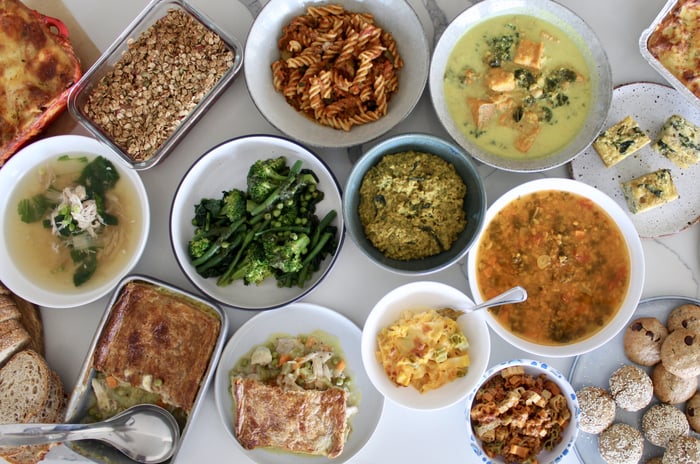BubbaDesk & The Role Of Nutrition When A Mum Returns To Work Postpartum
We’ve recently partnered with BubbaDesk, a coworking space with onsite childcare, and have been supporting their members with nutritious food as they return to work postpartum. BubbaDesk is a game-changer for working parents, and The Whole Bowl Co understands the significance in the role of nutrition when a mum returns to work postpartum in ensuring a successful transition.
Too often we look to support women after having their babies for only a few short weeks, 6 is the usual amount of time. After that, the Dr says they have recovered from birth, that they can resume usual activities and that’s that. Subsequently, it really becomes about the baby and their well-being, milestones and growth. The fog has barely cleared for a woman at the 6 week mark. The transition from maiden to mother is one of the most transformative periods of a woman’s life and one that you truly cannot prepare for. This transitional period of early parenthood extends from pregnancy, birth, postpartum to toddlerhood and all that having very small, dependent children entails. There are highs and lows, ebbs and flows, good weeks and bad. Periods of minimal sleep, illness, feeding issues, exhaustion, depletion and overwhelm.
One very difficult stage, mostly unspoken of, is when the partner returns to work. Whether it has been days, weeks or months that there was an extra pair of hands for the settling, soothing and all-nighters - they are suddenly gone. Left alone to find a new rhythm, routine - just the two of you. It can be long days without a shower or anything to eat, it can be walks around the block that last for hours to calm the baby, it can be lonely and very tiresome.
Another challenging phase will be when the primary caregiver, often the mother, returns to work. The lead up to this week is intense, the baby is usually starting daycare or another care solution. Often weaning off breastfeeding, at least daytime feeds. It can be such an overwhelming and emotional time. This woman, so different to who she was when she left for maternity leave, a completely different person really, returning to often a very different work environment, sometimes part time, a new team, a new boss, a new office. Riddled with feelings of guilt. Guilty for leaving the baby at daycare, usually with many tears at drop off in those early days. But also guilty for their employer, that their mind isn’t as clear and sharp as it was before. They don’t know new things about the market they work in or new clients, they are operating on a few hours sleep and don’t feel fully present.
That period is really chaotic. Rushing to and from daycare to work, always watching the clock, always watching their phone hoping that the daycare number doesn’t flash up. Never feeling like you’re giving anyone 100% of what they need - baby, work, partner, yourself.
Regardless of all of this, it’s often an unavoidable rite of passage. Whether the child is 6 months or 3 years, those initial feelings and that experience is inevitable if returning to work. Unfortunately, still, very little is done by society and the workplace to support that period.
BubbaDesk is now supporting parents through this period by offering a solution to returning to work with on-site childcare. Less guilt, better work/life balance and a more productive day knowing that you can fully focus on the task at hand with bub nearby being looked after by professionals. Grabbing a Whole Bowl soup out of the freezer to take as a nutritious lunch really rounds out the ideal, wholesome return to work situation.
The role of nutrition when a mum returns to work postpartum through supportive diet during these periods can provide the mental and physical strength required to get through as unscathed as possible.
Spending the time planning out how to fuel the body in those weeks and months can truly make all the difference in feeling strong and empowered or exhausted and depleted. If I have learnt anything as a woman and a mother, it's that no-one is coming to save us, we have to do it for ourselves and our kids. It’s up to us to create the mindset, lifestyle and diet to set us up for the strongest and happiest versions of ourselves.
Co-founder/owner of The Whole Bowl Co, Daisy Manson is a degree qualified nutritionist. She shares some of her healthy eating principles that we can all incorporate into our every day, during the postpartum period and beyond, to set us up for health, energy, strength, success and well being.
Eat the Rainbow Every Day!
Brightly coloured fruits and vegetables are a rich source of antioxidants (think berries, beetroot, purple cabbage, red capsicum, pumpkin, leafy greens, oranges, kiwi fruit and many more). Antioxidants from food sources are more beneficial than from supplements. Abundant antioxidants in the diet support the immune system, crucial for healing and repair, reduce inflammation and support our mental health reducing the risk of postnatal anxiety and depression.
Include Protein at Every Meal.
Firstly ensure to have a protein rich breakfast. Protein balances blood glucose levels to sustain energy and mood throughout the day. Protein rich breakfast options include eggs or beans on wholegrain toast, a veggie frittata, a smoothie with protein powder, overnight oats with full fat natural yoghurt + nuts/seeds + fruit. Consuming sufficient protein supports hormone production to improve our sleep and mental / emotional health. Adequate protein is required for optimal immune function, tissue healing and repair.
Stay Hydrated.
Breastfeeding Mama's should aim to have 2.5 - 3 litres of fluids per day. Water, herbal teas, non-caffeinated drinks, brothy soups and juicy fruit/veggies help us stay hydrated. Both caffeinated and alcoholic drinks not only contribute to dehydration, they can also drive feelings of anxiety. Proper hydration supports lactation, promotes circulation for improved healing and encourages detoxification pathways.
Eat Fibre Rich Foods.
Include whole grains (brown rice, quinoa, wholegrain bread, rolled oats, buckwheat, barley, etc.), legumes (lentils, beans, peas), fruit, vegetables, nuts and seeds every day. Fibre consumption supports gut health and therefore countless aspects of our health and wellbeing, it promotes detoxification pathways including regulating bowel motions to limit stress on the already compromised post-birth pelvic floor. Hydration paired with fibre intake is key to perfect poos! You didn't think you would get through a nutrition post without mention of a poo did you? :)
Eat Nutrient Dense Foods.
Every time we eat it is an opportunity to fuel the body to help it optimally perform all its important processes. Nutrition does not just support energy levels it directly affects our hormones, our immunity and our mental health. What do I mean by "nutrient dense food"? Take toast for example: white sliced bread provides simple carbohydrates (sugar!). Wholegrain sourdough provides complex carbohydrates, fibre, protein, minerals such as magnesium and iron, also B vitamins. Just small changes like swapping your morning toast can significantly contribute to your intake of nutrients.
Eat What Makes Me Happy.
Allow cravings. I know if I keep putting off what I actually feel like eating I will likely end up eating it later anyway, and then feel guilty that I've eaten everything! Adequate fibre, protein and water throughout the day can help to reduce sugar cravings but if you feel like a Whole Bowl Cookie - go for it! Postpartum is a time for self care, self love and nourishment. It is not a time for restriction or making things harder on your self than they already are. If food is your love language like it is mine, allow yourself to include "treats" amongst regular programming.
At The Whole Bowl Co, we aren’t just on a mission to support women and their families throughout the postpartum period, we are looking to support women throughout their entire motherhood journey. From trying to conceive to parenting teenagers - nutrition and convenience of nourishing meals in the freezer will always play a critical role in supporting women throughout their motherhood journey.
When women thrive, their families will thrive, resulting in a productive and strong community.

